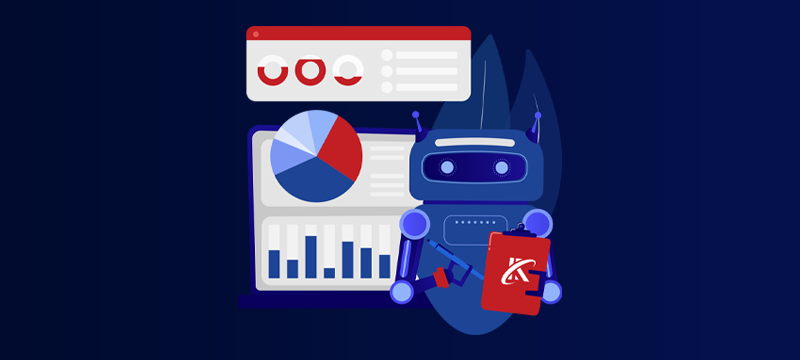If you run a business website, it’s likely that you will use a range of online marketing techniques to attract visitors. However, whether you use emails, PPC advertising, content marketing, social media or on-site strategies, it looks like artificial intelligence (AI) is going to have a transformative effect on how you market your business in the future. In this post, we look at how this might happen.
Contents
Personalisation at scale
For some years now, we have been writing about the benefits of personalising marketing content for your audience. One of the most noticeable impacts of AI on online marketing is the degree of personalisation it offers. In the past, creating customised content for each user was impractical, instead, the focus was on addressing audience segments.
With AI, however, businesses can serve tailored content to vast audiences simultaneously. Machine learning algorithms sift through data, discerning patterns and preferences, allowing AI platforms to deliver highly personalised experiences.
Down the line, this will signal the end of one-size-fits-all marketing campaigns as AI will be able to deliver truly bespoke experiences to individual customers.
Improved customer insights
Data analytics is a powerful tool that marketing professionals have been using for some time. AI takes it to a completely different level. By using AI, businesses can quickly identify patterns, make predictions about future trends and uncover user preferences that might have otherwise gone unnoticed. Indeed, companies don’t even need to purchase their own tools to take advantage of some AI insights.
Platforms like Google Analytics, which many website owners already use, employ AI and machine learning to provide deeper insights into user behaviour, helping online businesses make more informed marketing decisions.
Real-time engagement
Real-time engagement has become a staple of modern online marketing and customer service, thanks in part to AI-driven chatbots and virtual assistants. These evolving technologies, driven by natural language processing (NLP), can simulate human interaction, handling queries, complaints and even sales processes.
Explore the future of eCommerce with Visual AI! Read How Visual AI is Reshaping eCommerce
Programmatic advertising
Most ad buying today involves using platforms like Google Ads and Facebook Ads that come with lots of built-in tools to help businesses manage their spending and reach the right audiences. To make the most of online advertising, there has been a significant growth in the development of programmatic advertising technology which enables the automated buying of ad space using AI. This method allows advertisers to target audiences more precisely and use their budgets more efficiently. By evaluating vast datasets in real time, AI can determine the optimal ad space to purchase and the best audience for a given ad.
This can lead to greater ROI for businesses and a more relevant ad experience for users. With the rise of omnichannel marketing, most of these tools are independent of the major advertising networks, with the exception of Google Ad Manager, which has both free and paid-for services. The rest are paid for on a subscription basis.
Predictive analysis
Imagine being able to forecast the future needs and behaviours of your consumers. With AI’s predictive analysis capabilities, this is becoming a reality. Businesses can use AI to anticipate future trends or user actions, allowing them to be one step ahead of the competition.
Whether it’s predicting which products a consumer might be interested in next or forecasting market shifts, AI offers a crystal ball-like insight that was previously out of reach. It’s worth bearing in mind, however, that no-future forecasting is infallible – there’s always the potential for unexpected events, like wars or pandemics, to have an impact.
Enhanced visual recognition
Visual search is emerging as a powerful tool in online marketing. AI can now analyse images, making it possible for users to search for products using pictures instead of words. Google Lens is a good example of this, though its focus is not entirely on finding products.
This technology not only improves user experience but offers brands new avenues for showcasing their products. Additionally, AI-driven visual recognition is aiding in monitoring brand presence
across the web, tracking where and how logos or products appear, and ensuring brand consistency and integrity.
Conclusion
The evolution of AI is reshaping today’s marketing landscape. With enhanced personalisation, better data insights and innovative ways to engage audiences, it is becoming a powerful tool for online marketers.
Need reliable hosting that can flawlessly handle AI applications and keep your data safe? Check out our Enterprise Cloud Server Hosting solutions.


